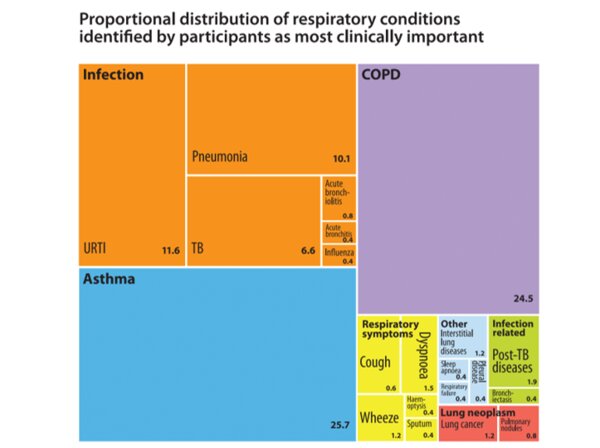IPCRG Research Prioritisation 2021
In 2021 the IPCRG updated its research priorities following an e-Delphi exercise that asked primary care professionals about their priorities for research. 112 community-based physicians, nurses and other healthcare professionals from 27 high, middle and low-income countries shared their views, contributing 608 questions. An expert board of academics selected 49 questions as detailing the highest priorities to help improve clinical guidelines and patient care globally. These findings are now published in the npjPCRM.
Why do this?
Primary care plays a central role in the prevention, diagnosis and management of lung disease. Symptoms affecting the lungs are the most common reason for primary care consultation. To help improve primary care practice for the benefit of patients, future research must focus on areas that are relevant and informed by the primary care community; those on the front-line of this problem.
Prioritising research needs helps guide researchers, research funders, and policymakers and will ultimately improve clinical guidelines and patient care globally. This exercise builds on IPCRG’s 2010 Research Needs Statement and the 2012 Research Prioritisation and key findings. It also reflects the UN’s Sustainable Development Goals (SDGs) and sits within the context of the World Health Organisation (WHO) research agenda for non-communicable diseases, which not only prioritises chronic respiratory diseases and tobacco control, but specifically emphasises the core role of primary care in the management of long-term conditions.
The results
- Asthma and COPD were the most frequently mentioned diseases (17,2% and 15.2%) and the diseases of most concern (25.7% and 24.5%).
- Infectious respiratory diseases taken together (TB, pneumonia) were mentioned most (34.8%) and were also of highest concern (29.9%).
- The most frequent specific questions were around COPD management and asthma self-management.
The most popular questions are shown in the table below.
Asthma and COPD were the diseases that concerned primary care clinicians the most, but taken together infectious lung diseases like tuberculosis (TB) and pneumonia were of highest concern. COPD management and asthma self-management were the most popular topics, followed by asthma management and prognosis, COPD diagnosis and screening and TB in primary care, as shown in the figure below.
Some of the questions illustrate that existing evidence is either unknown or not integrated effectively into guidelines that are useful in primary care. More effective training of primary care clinicians and guidelines specifically for primary care, adapted for local and low resource settings, are needed. Primary care has a role to empower patients to improve the self-management of their disease and different approaches to care need to be taken. Challenges in primary care that would benefit from more research include alternative approaches to care, the need for simple and accessible diagnostic tools and the most cost-effective ways to stop smoking as well as addressing over- and under- use of medicines such as inhaled corticosteroids. COVID-19 has affected care provision and changed how care will be delivered in the future. It will be important to allow for these changes in primary care when shaping our research agenda.
Identifying priorities in research since 2010
The IPCRG Research Needs Statement 2010 identified the main questions facing both clinicians and patients in community situations in respiratory diseases and conditions. The statement was developed by over 40 contributors from over 62 countries with a wide range of health and socio-economic systems and resources, and was complimented by the 2012 prioritisation exercise. This statement highlights that research needs to recruit patient’s representative of primary care populations, evaluate interventions realistically and draw conclusions that are meaningful to primary care professionals. It also noted that despite guidelines there is little evidence on the best strategies for implementing these recommendations. This statement remains valid 10 years later and we continue to push for research work to address these issues.

